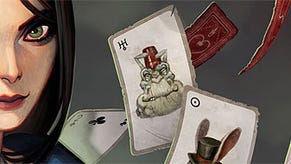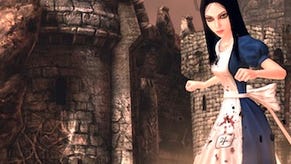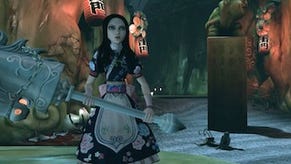American McGee: “We're not trying to reinvent the wheel”
Hands-on with Alice: Madness Returns reveals a puzzle-platformer that's familiar, but the furthest thing from comforting. Quotes, quirkiness, interview with American McGee.
The eye-catching premise of American McGee's vision of Alice, in case you missed it the first time around, is that Wonderland exists inside her head. Following her innocent childish adventures in Lewis Carrol's stories, her imaginary realm has been twisted into a macabre nightmare by real-world trauma. Alice's entire family perishes in a fire, and she is incarcerated in an asylum with her own nightmares.
In Alice: Madness Returns, she has been released into the care of a psychiatrist in real-world London. But her psychology is no less twisted, and her trips into Wonderland are no less psychedelically monstrous. The story revolves around Alice's suspicion that somebody started that fire, but it's an open-ended mystery, as American McGee explains.
“The first part of the mystery is obvious. It's 'who killed my parents?'" he says. “But the second half it's less obvious – it's more about 'who am I?'
“There's also some question about whether or not she was complicit about what happened when her family died. The main principle is knowing the character, and letting everything flow naturally form her.”
Like its predecessor, Alice: Madness Returns is a third-person puzzle platformer – a genre that was dominant 11 years ago when the first Alice was released, but has since bowed to the FPS and more conventional action-adventure. As such, Madness Returns feels more than a little old-fashioned – although, with it horrendous enemies, twisted environments and blood-soaked, ominous feel, it could hardly be described as comfortingly familiar.
“There's some question about whether or not she was complicit about what happened when her family died."
Giant flowers shrink Alice down to miniature, revealing ghostly outlines of platforms and chalk-scrawled arrows on the walls that weren't visible before. She jumps and floats with a parasol – this isn't a game that demands precision plaforming – and fights with the same Vorpal Blade dagger that she used to liberate Wonderland from her own insanity the first time around.
She also has a hobby horse mallet, a teapon cannon and a pepper-grinder machine gun, all three familiar weapons in unfamiliar clothing. The same can be said for much of what we see of Madness Returns: it's a fairly conventional puzzle platformer, with all the collectibles and floating platforms and combat that it implies, but it's all inverted, twisted into something quite monstrous. The collectibles are teeth, the platforms float through Escher-esque tangles of warped buildings, and the enemies are bloodstained cloth playing cards with screaming skulls for faces.
Structural familiarity
Given that the game is based upon the psyche of a mad person – a person, in other words, whose perception differs drastically from those around her – this structural familiarity juxtaposed against the twisted aesthetic might actually be quite a clever commentary on the nature of madness. There are moments of deviation from the template – there are side-on platforming levels, and various quirky sections where Alice must do things like take off her own head and roll it around a maze, Marble Madness style – but otherwise, McGee says, it's not pushing the envelope gameplay-wise.
“The gameplay is important, but at the same time gameplay really has to be presented in a way where it's sublime – where it moves outside of and away from the core of the product, which is the aesthetic, the narrative and the characters,” he says.
“What it comes down to is the presentation of the story and the character. The gameplay fits with that thematically, but it's not trying to set itself out as a reinvention of the wheel. It's not trying to innovate on that genre, because there's already a core there that, presented the right way, is enjoyable.”
Instead the innovation comes from the presentation. This is an Unreal 3 game that does not look at all like an Unreal game – indeed, McGee mentions that the art team has spent a lot of time trying to distance it artistically from its engine.
Better than Burton?
Madness Returns doesn't confine itself solely to the inside of Alice's head. There are also sections set in real-world London as she pieces together what actually happened to her family. But the two settings often intertwine, taking inspiration from each other.
“We created a rule that nothing could exist in Wonderland that wouldn't be based on something she had seen or experienced in London,” says McGee. “Wonderland is always inspired by Alice's real world experiences, and in London we do a lot of foreshadowing of what's coming next.”
Of all the re-imaginings of Lewis Carrol's creation, American McGee's Alice still stands out as one of the most creatively interesting. The darkening and twisting of fairy tales is something that horror films and literature have been doing for a long time (though some things, like the Grimm Fairytales, could hardly be darker and more horrifying if you tried), but for games this is still fairly new.
But what's it like developing a game set inside someone's head? McGee claims that it's a unique creative challenge – and the studio's understanding of the character is central to overcoming it.
“From the beginning you have to have a very clear understanding of who Alice is as a character, of her psychology, you have to understand the damage that's been done to her, and you have to understand what it is that she's after – because oftentimes even she's not clear about that,” he says.
“She has to identify herself as the tool that overcomes her problems. Madness is not recognising the fact that you have control. The first game was about her having control over her internal psychology. This game is about grasping control of the real world. Part of our job is to get out of the way of it, get out of the way of her character.”
As always, it's difficult to tell whether there's more to Alice: Madness Returns than it first seems, or whether its aesthetically fascinating but mechanically unexceptional vision of Wonderland lays everything out on the table from the very beginning. Even if that's the case, though, simple gameplay won't necessarily hold Alice back. Sometimes you have to look beyond the basic mechanics of a game to see what's interesting about it, and those games are often the most memorable.
Alice: Madness Returns releases for PC, 360 and PS3 on June 14.



















.png?width=291&height=164&fit=crop&quality=80&format=jpg&auto=webp)